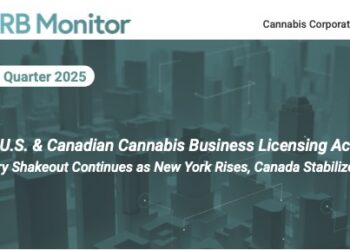Law enforcement in some Indiana counties have been threatening retailers with arrest for selling hemp-derived cannabinoids, and in one case confiscating products and cash, under the authority of an official opinion by Attorney General Todd Rokita.
In January, Rokita, in response to questions from the Indiana State Police and Indiana Prosecuting Attorneys Council, said that THC variants, including delta-8 THC and delta-10, are synthetic derivatives and, therefore, illegal Schedule I controlled substances under Indiana state law.
“Even in their natural forms, however, they would still be controlled substances, as Indiana law schedules the extracts of all cannabis species, making only limited exceptions for substances with concentrations below 0.3% delta-9 THC,” he wrote.
Delta-THC retailer Wall’s Organics, manufacturer 3Chi and the Midwest Hemp Council have sued Rokita in U.S. District Court, as well as local police detectives and county prosecutors, seeking a ruling that the attorney general’s opinion violates state and federal hemp laws and an injunction preventing law enforcement from using it to prosecute the sale, possession, manufacturing, financing or distribution of THC hemp extracts that are not more than 0.3% delta-9 by dry weight.
While there have been many court cases recently challenging state laws seeking to regulate and ban hemp-derived cannabinoids, this case is specifically focused on the professional opinion of the state’s top prosecutor without any change in the law.
“On January 12, 2023, the Indiana hemp market that had operated smoothly over the last five years was turned on its head when AG Rokita issued the Official Opinion,” the amended complaint filed Aug. 16 states.
As a result of this letter, “We had about 13 county prosecutors (out of 92) that sent threatening letters to retailers from July until about September, but the lawsuit basically created an unofficial truce until we get direction from the federal judge,” said attorney Justin Swanson, a partner and chair of the cannabis practice at Bose McKinney & Evans, in an email. Swanson is also president of the Midwest Hemp Council.
The complaint also alleges that financial institutions in Indiana have cited the opinion when refusing banking services and financing to Midwest Hemp Council members and 3Chi, an Indianapolis-based manufacturer and distributor of low-THC hemp extracts. As a result, 3Chi had to find an out-of-state bank and lost wholesale customers.
The lawsuit claims Rokita changed his mind about the legality of hemp extracts. The attorney general met with 3Chi owner Justin Journay in 2021 and was told about 3Chi’s production of intoxicating, low-THC hemp products.
“The Attorney General expressed no concerns to Mr. Journay, and in fact, implied support for Mr. Journay’s operations in Indiana,” stated the Nov. 9 reply to the defendants’ motion to dismiss and in support for a preliminary injunction.
Threats and confiscations
According to the complaint, Evansville Police Department Detective Sgt. Nathan Hassler visited Wall’s Organics on Aug. 4. As he told the owner to remove all low-THC hemp extract products, Hassler handed the owner a copy of Rokita’s opinion.
“Detective Sergeant Hassler informed Wall’s Organics that he would return to the store and that he did not want to see any Delta-8 THC or other low THC extract products on the shelves when he returned, or arrests would be made,” the complaint said.
The owner removed the products and experienced a 30% reduction in sales after one day. “Such losses will continue as these products account for approximately 90% of the store’s revenue,” according to the complaint.
The same thing happened Aug. 11 to 3Chi customer Sky Vape Shop in Huntington, which is not a plaintiff in this case. The complaint claims low-THC products account for 70% of Sky Vape Shop’s revenue.
Hemp-derived cannabinoid products were actually confiscated by Huntington police on Aug. 5 from Front Row LLC, a convenience store that is also not a plaintiff in the complaint.
Front Row partner Shamyal Das told CRB Monitor that police took “all the delta,” including gummies and vape. They also took his cash and cash register, he said.
The complaint said arrests have been made and the owners were told possession and sale of low-THC extract products was a Level 2 felony, punishable to up to 16 years in prison. When asked about the arrests, attorney Swanson said, “A warrant has been issued for their arrest, but law enforcement is holding off until we get a court decision.”
Das said he hasn’t been threatened with arrest or prison. But he questioned why police took the product and are “not running the case.”
However, Huntington County Prosecutor Jeremy Nix, who is named as a defendant, told CRB Monitor that no criminal charges have been filed against the Front Row owners and, therefore, no arrest warrants have been issued. He confirmed property was taken as a result of the search warrant, and the owners face a potential Level 2 felony. But there is no statute of limitations for Level 2 felony charges. He said they do have recourse to ask for their property back.
Nix said that any delta-THC products above the delta-9 legal threshold are illegal if synthesized or man-made. “The attorney general’s opinion is not binding on me, but it provides additional evidence to support that reasoning.”
Nix said nobody has been charged on this issue in Huntington County, but he would not comment on whether other search warrants have been served.
Das said people are showing him that they can still buy hemp THC products from stores in other counties. “It’s legal in other counties,” he said.
But for now, Front Row isn’t selling the products because of the risk. “We’re a small business,” Das said.
“The real impact of the attorney general’s opinion on this is they’ve reduced our state market to a county-by-county market,” Swanson said.
An opinion on an opinion?
In response to the lawsuit, Rokita and his deputy attorneys general claim a number of legal challenges, including that the 11th Amendment generally immunizes state officials from being sued in federal court. Noting that Front Row and Sky Vape are not party to the suit, they also claim that the actual plaintiffs do not have legal standing because they have not suffered an “injury of fact.”
The state’s response said the “heart of the issue” is whether the attorney general is right or wrong. “In other words, they continue to seek relief the judiciary lacks authority to give – an advisory opinion on a non-binding statement from the Attorney General.”
While they acknowledge that some prosecutors have cited the opinion when issuing cease-desist letters, “Whatever the Attorney General’s opinion says, the duty to ‘conduct all prosecutions for felonies, misdemeanors, or infractions’ belongs to county prosecutors,” brought under “unchallenged state statutes.”
“In sum, State Defendants effectively argue that Plaintiffs must wait to be arrested under Indiana’s controlled substance laws, be charged with felonies threatening decades in prison, and then, and only then, bring suit against the state, police officers, and prosecutors for enforcement of the new unconstitutional interpretation of the existing controlled substance laws,” the hemp companies said in their response. “That is not the law, and it certainly does not comport with common sense or preservation of judicial resources.”
Hemp laws and legal opinions
The lawsuit claims that the attorney general’s opinion violates both the federal Farm Act and Indiana’s Senate-Enrolled Act 52 (SEA 52), both passed in 2018. The complaint says SEA 52 exempted “low THC extract” from the definition of marijuana and controlled substance.
But the attorney general said other state statutes define “low THC hemp extract” as containing no more than 0.3% total delta-9 THC, “including precursors, by weight,” similar to the Farm Act.
Rokita’s response also mentions that the Seventh Circuit U.S. Court of Appeals already decided in 2020 that the Farm Act allows states to regulate hemp production within its own borders, allowing for an Indiana law that banned “smokable hemp” products specifically.
“Plaintiffs here have brought the same claims, simply repackaged for related products. But the Seventh Circuit was clear: The Farm Bill expressly left States broad discretion to regulate hemp more stringent[ly] that federal law,” his response said.
Swanson is very familiar with that appellate court case as he was an attorney for the plaintiffs, C.Y. Wholesale. This complaint intentionally avoids the specific law considered by the appellate court.
The key distinction between C.Y. Wholesale v. Holcomb and this current case is that there has been no change in the state law, only the interpretation of existing laws, Swanson said.
The hemp companies said the attorney general’s references to the Seventh Circuit case are misplaced.
“In fact, in 2022 the Indiana General Assembly rejected an amendment that attempted to narrow the definition of ‘hemp product’ to require that all THCs (like Delta-8 THC) be below .3% among other restrictions,” the plaintiff’s response said. “Having failed to convince the Indiana General Assembly to change the law, the Indiana Attorney General instead merely concludes, via executive fiat, that certain low THC hemp extract products are now illegal in Indiana and encouraged law enforcement and prosecutors to take aggressive action. And some have.”
When asked for comment on this case, Todd Rokita’s media director responded in an email, “Our filing on this speaks for itself. We have nothing more to add at this time.”
Meanwhile, differing federal court rulings on whether states can more strictly regulate hemp cannabinoids under the 2018 Farm Act are headed to other circuit courts for review.












